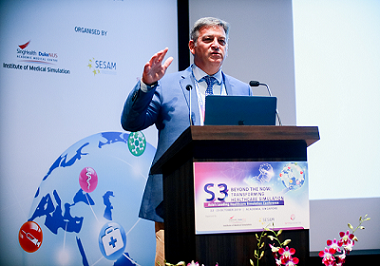A Low-cost Innovative Simulator for Hemorrhoid Ligation Training Using Repurposed Materials
Introduction:
High costs and limited accessibility of commercial hemorrhoid ligation simulators restrict hands-on training, particularly in low- and middle-income countries (LMICs), compromising procedural competency. This project developed a low-cost, reusable, anatomically accurate simulator using repurposed materials to enhance training, promote sustainability, and improve accessibility for medical trainees in resource-limited settings.
Description:
The simulator was constructed using silicone skin from discarded intravenous (IV) arms to mimic rectal texture, plastic pipes to simulate the intestinal tract, and medical-grade silicone for hemorrhoidal tissue. A reinforced frame ensured stability for repeated use. The design process involved shaping silicone for realism, attaching pipes and hemorrhoids, and testing with a standard ligator tool. Iterative refinements, based on feedback from trainees and faculty, improved material elasticity and structural durability. Testing validated realism, functionality for ligation practice, and durability, confirming the model’s effectiveness for training.
Discussion:
The simulator enhanced trainee confidence and proficiency in hemorrhoid ligation, with faculty validating its realism and practicality. By repurposing medical waste, it reduced costs significantly compared to commercial models and supported sustainable healthcare practices. Suitable for workshops and assessments, it improves access to training in LMICs. Future improvements will enhance material elasticity, add simulated bleeding, an d increase durability for broader scalability.
© 2025 SingHealth Group. All Rights Reserved.














